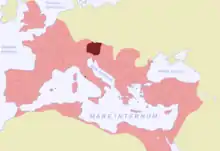Noricum
English
Proper noun
Noricum
Related terms
Latin
Etymology
From Ancient Greek Νώρικον (Nṓrikon), from an unknown source predating the Celts' arrival. Said to be a Phrygian or Thracian word, but of unclear meaning.
Robert Ellis (1855) supports a relation to Phrygian νώρικον (nṓrikon, “(wine)skin”), offering the hypothesis that the place derived from the hollowness of the river-valley. For semantic parallel, he cites Welsh cwm (“valley”), which derives from Proto-Indo-European *kumbʰo-, *kumbʰéh₂- (“vessel”).[1]

The province within the Roman Empire
Pronunciation
- (Classical) IPA(key): /ˈnoː.ri.kum/, [ˈnoːrɪkʊ̃ˑ]
- (modern Italianate Ecclesiastical) IPA(key): /ˈno.ri.kum/, [ˈnɔːrikum]
Proper noun
Nōricum n sg (genitive Nōricī); second declension
Declension
Second-declension noun (neuter), with locative, singular only.
| Case | Singular |
|---|---|
| Nominative | Nōricum |
| Genitive | Nōricī |
| Dative | Nōricō |
| Accusative | Nōricum |
| Ablative | Nōricō |
| Vocative | Nōricum |
| Locative | Nōricī |
References
- Ellis, Robert (1855) “On the probable Connexion of the Rhaetians and Etruscans with the Thracian stock of nations”, in The Journal of Classical and Sacred Philology, volume II, published 2012, , pages 3-4
Further reading
- “Noricum”, in Charlton T. Lewis and Charles Short (1879) A Latin Dictionary, Oxford: Clarendon Press
- Noricum in Gaffiot, Félix (1934) Dictionnaire illustré latin-français, Hachette.
This article is issued from Wiktionary. The text is licensed under Creative Commons - Attribution - Sharealike. Additional terms may apply for the media files.